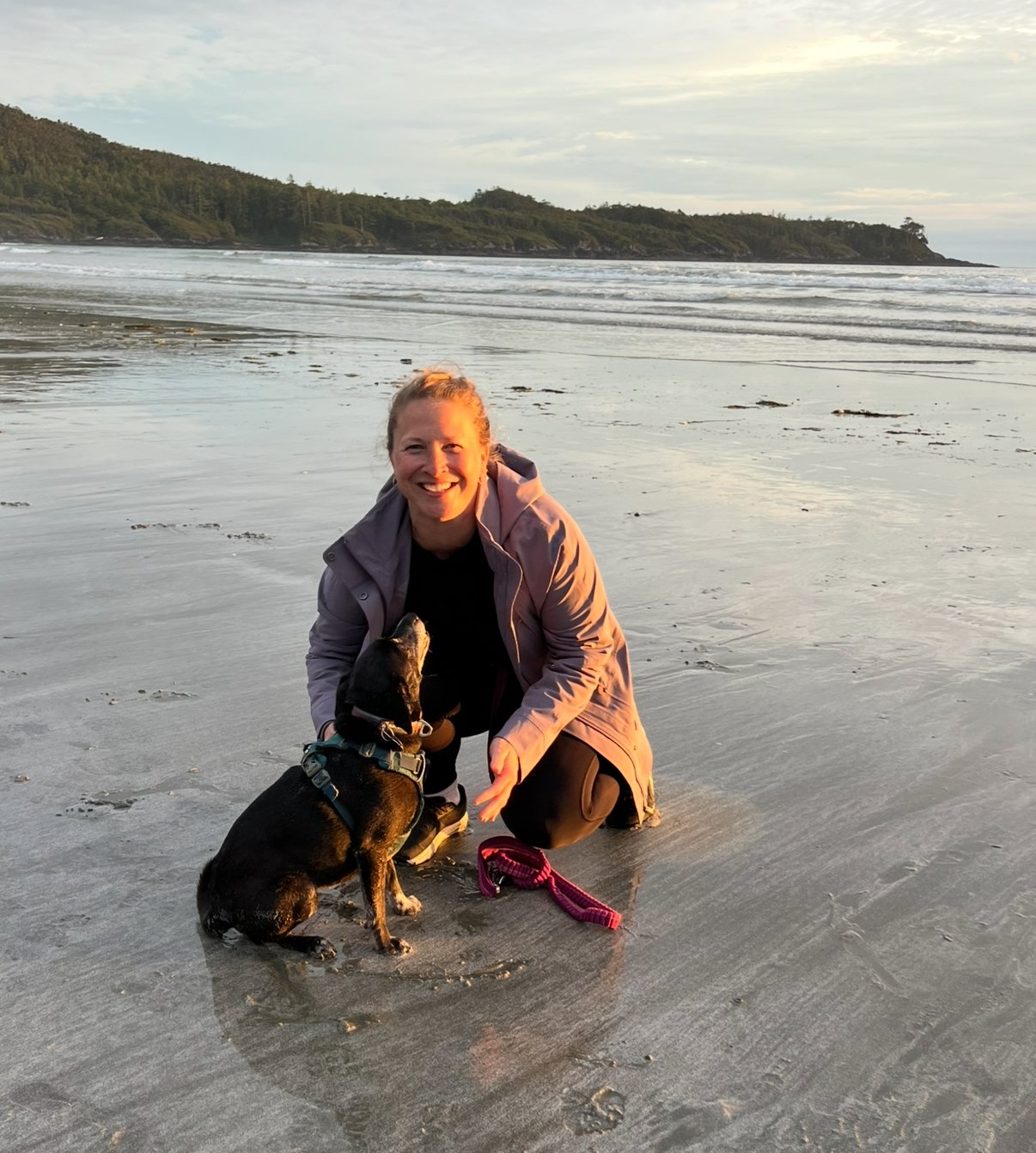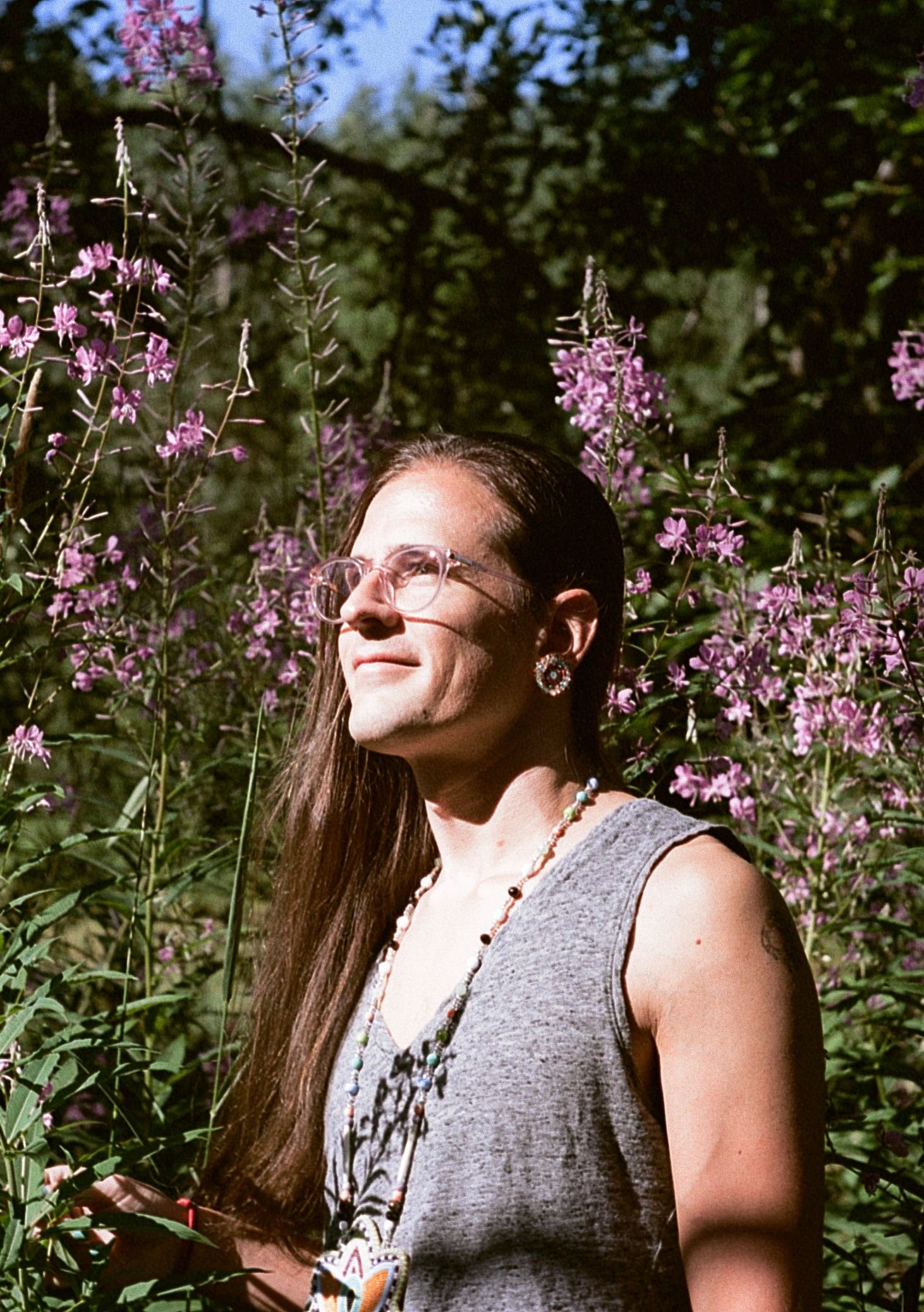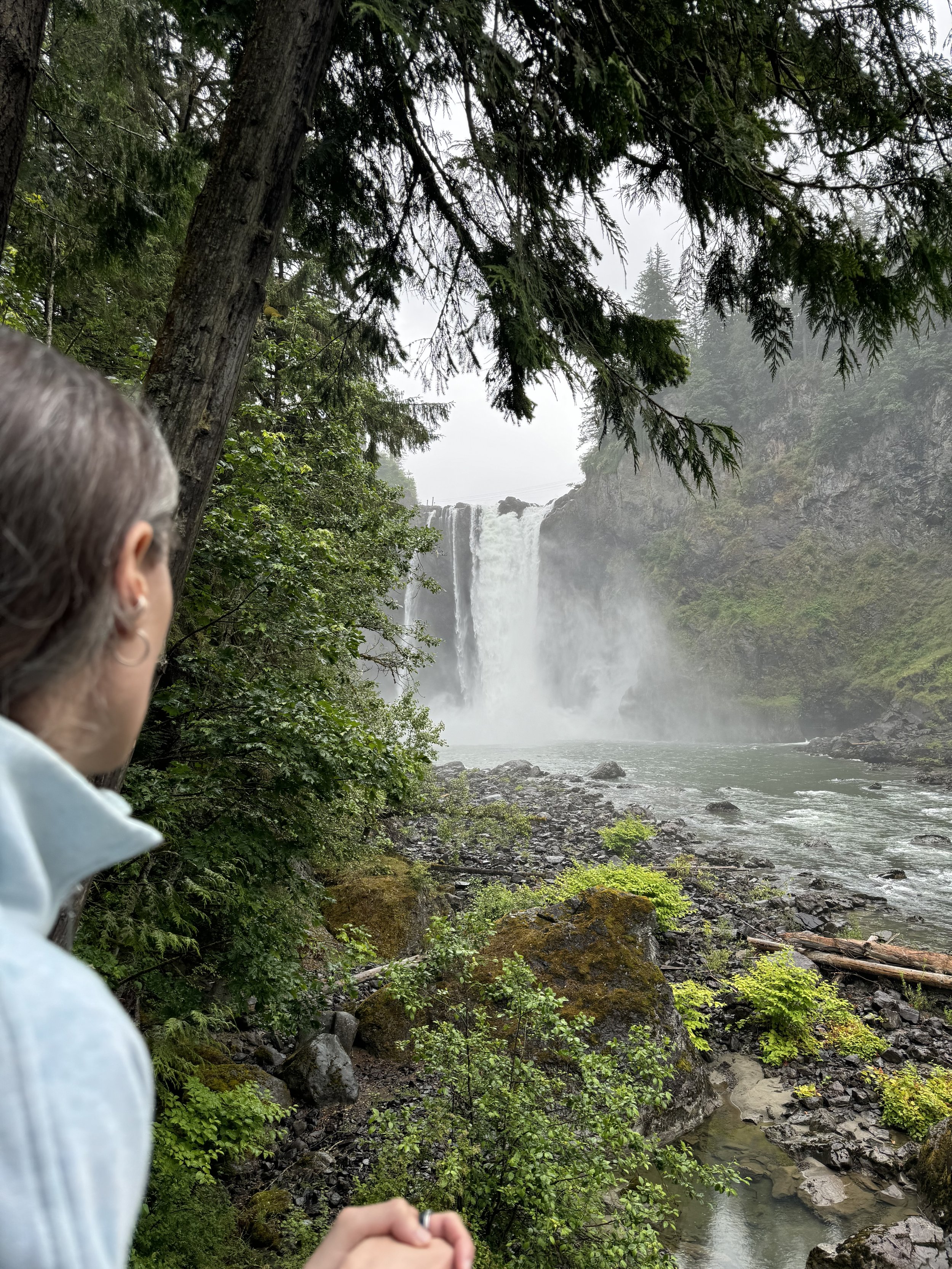
Anna Driscoll, (Tlingit and Unangax̂) formline design with pencil on paper and Alicia Edwards (Colville Confederated Tribes - Okanogan Band), vectorization in Adobe Illustrator
WHO WE ARE
In the beginning, as told in the Tsimshian creation stories, the world sat in darkness. The people lived without the sun, moon, or stars—until Raven, curious, cunning, and full of purpose, stole the light and brought it to the world. In doing so, Raven gave more than brightness to the sky—Raven gave clarity, possibility, and the power to see one another fully.
At The Raven Collective, we carry forward that story. Like Raven, we seek out the light hidden within systems, within stories, within communities. We believe health is not simply the absence of disease, but a state of sovereignty—a light that every person, family, and Tribal Nation has the inherent right to carry.
We walk beside Indigenous communities to illuminate what has been obscured by colonization, extractive systems, and inequity. We help uncover the strengths, knowledge, and pathways that already exist, and we work to co-create futures rooted in justice, wellness, and self-determination.
Our work is grounded in Indigenous values, Tribal sovereignty, and the belief that each Nation should shape its own systems of care. Through a systems-based, relational approach, we honor the complexity of health while remaining accountable to the lived realities, culture, and wisdom of the people we serve.
Like Raven, we are not merely messengers or observers—we are part of the story. And in this work, we are guided by curiosity, respect, and a shared vision of a world where light—health, wellness, and power—belongs to the people.
Collective leaderShip
JESSICA LESTON: OWNER / PARTNER
Jessica Leston (she/her), is a public health advocate and an enrolled member of the Ketchikan Indian Community. She is the owner/partner of The Raven Collective.
Jessica’s roots are both Indigenous and settler. Her mother’s family are settlers originally from Germany, Sweden, and Ireland, while her father’s side comes from Austria, Finland, and the Tsimshian people of Southeast Alaska. Though she grew up in Chicago, her summers in Alaska with her grandmother’s family shaped her sense of identity, purpose, and connection to the land. "I remember climbing Deer Mountain, picking huckleberries around Ward Lake, and watching the salmon return to Ketchikan Creek Falls," she recalls. It was during these moments—learning from her grandmother—that she first understood the importance of reciprocity. "When you pick berries, you always give thanks and leave gifts," her grandmother taught her, a lesson that continues to guide her approach to public health: to give back, to uplift, and to honor relationships.
Jessica’s career has been dedicated to building Indigenous-led solutions that question and challenge systems and foster collective well-being. Her work has contributed to initiatives designed to strengthen health equity, interconnection, and healthcare access for Indigenous communities.
Guided by the Alutiiq cultural value, "We are responsible for each other and ourselves," Jessica envisions a future where Indigenous communities thrive—where storytelling, advocacy, and relationality serve as counterforces to structural violence, inspiring transformational change in Indigenous health.
Alicia Edwards: Contractor / Partner
Turtle Island Media Group
Meet Alicia Edwards (she/her), a proud member of the Colville Confederated Tribes (Okanogan Band) and the visionary founder of Turtle Island Media Group (TIMG). Alicia's childhood was steeped in the natural beauty of Okanogan County. "I remember sun-drenched mornings working with the horses," she recalls, "learning the value of hard work and the deep connection between people, our animal relatives, and the land." This foundation and a love for family, outdoor adventures, and sports shaped her commitment to community.
After graduating in May of 2020 with her MPH from Eastern Washington University, her public health career began during the COVID-19 pandemic. As a communications specialist with the Great Plains Tribal Leaders Health Board (GPTLHB), Alicia was on the frontlines of public health communication. Later, at the Northwest Portland Area Indian Health Board (NPAIHB), she contributed to impactful initiatives like syphilis and HIV/PrEP campaigns, and the development of NativeHealthResources.org.
However, a calling resonated within her – Alicia recognized a significant gap: Indigenous representation in health media. While working on various campaigns, she noticed that design was often outsourced to non-Indigenous companies. "They did great work," Alicia acknowledges, "but I dreamed of a company led by Indigenous artists, dedicated to improving health outcomes in Indian Country." That dream materialized as TIMG in January 2025.
The catalyst for TIMG's creation was a poignant moment. "Alicia, this is amazing. Growing up, I never saw myself on these materials at the clinic," a relative remarked after viewing some of the materials on Native Health Resources. This simple statement underscored the critical need for authentic Indigenous representation. TIMG's mission is clear: to craft culturally relevant designs, resources, and media that amplify Indigenous voices and stories, driving positive health outcomes.
“The power of Indigenous representation in media lies in its ability to reclaim narratives and promote cultural understanding. When coupled with culturally tailored health information, we create more effective and equitable healthcare.”
Ashley Hoover: Contractor / Partner
Ashley Hoover (she/her) was born and raised in the Florida Keys. Her roots are established from settlers from various backgrounds: her mother’s family is Spanish, Cuban, and of British/Irish descent; her father’s family are Pennsylvania Dutch and Eastern European Jewish descent. Her childhood spent on and in the water, learning about weather patterns, the stars, and our connectedness to marine life established a life-long love for the ocean, the environment, and our responsibility of reciprocity we hold for each other and the Earth we share.
Ashley found her way to working in Indigenous Health through an internship in 2014 at the Northwest Portland Area Indian Health Board where she worked on Maternal and Child Health epidemiology. After graduating from the Tulane School of Public Health and Tropical Medicine in 2015 and working five years on perinatal HIV and congenital syphilis surveillance and prevention activities at the Louisiana Department of Health STD/HIV Program, she found her way back to working in Indian Country and supporting community-led prevention efforts that address systemic and root societal issues that cause health inequities associated with maternal and infant health, sexual health, and safety.
Her professional and self-work over the last decade has involved challenging and dismantling colonial belief systems and infrastructure, racism, transphobia, and homophobia through supporting community-driven public health solutions that moves the needle toward a more equitable and inclusive world for every human—one that not only accepts but demands health as a human right.
The name Pez Luna, Spanish for sunfish, is meant to honor her Hispanic heritage, her childhood spent sailing with her dad on a Sunfish sailing dinghy, and her love of the ocean.
Itai Jeffries, phd: Contractor / Partner
Itai Jeffries, PhD (they/them/y’all) is a sociologist, educator, researcher, and consultant whose work spans tribal public health, 2SLGBTQ+ healthcare, systems and movement capacity building, and organizational development. They joined the Raven Collective to help create meaningful, relationship-centered solutions that address the barriers Indigenous Americans—especially trans and gender-expansive people—face in accessing equitable healthcare.
Itai is yesah/Occaneechi and settler. They were born and raised on Occaneechi and Sappony lands in rural North Carolina, where they grew a deep love for working with the land, learning from the foods and medicines she offers, building community, and appreciating the healing power of humor. Now based in Western Washington on the lands of the Duwamish and Coast Salish peoples, Itai co-stewards an urban microfarm with their sister Tui (and a flock of kooky hens).
Guided by a belief that everyone deserves dignity, respect, and access to wellness, Itai grounds their work in the stories, families, and intergenerational memories that shape us. They believe in the power of tapping into these roots—and in celebrating the intersections between us—to overcome barriers and build collective thriving. This belief is central to their contributions at the Raven Collective.
Christina Friedt: Contractor / Partner
Christina Friedt is a policy analyst, strategic advisor, consultant, and dedicated advocate for public health. Her career has focused on children, families, tribal public health, strategic campaigns, capacity building, organizational development, and trauma-informed leadership. Christina was raised in Kingston, Washington. The daughter of Chun Ok and Chris Friedt, she spent her childhood surrounded by a large and loving immigrant community enjoying her cousins, aunties, and uncles, learning the ways of her ancestors, and navigating the complexities of balancing two cultural identities.
Christina joined the Raven Collective to continue her work to dismantle institutional and structural racism and colonial belief systems. Christina’s approach integrates servant leadership and trauma-informed principles, ensuring meaningful impact in public health, legislative processes, and community engagement. Her career reflects a deep dedication to equity, resilience, and transformative change.
For the past 10 years, Christina has played a pivotal role in expanding the Community Health Aide Program (CHAP) beyond Alaska, contributing expertise in coalition-building, policy analysis, legislative, administrative, and budget processes, and strategic investment and partnerships.
Earlier in her career, Christina served as the Health Policy Director at the Children’s Alliance and a staffer in the US House of Representatives. Residing in Seattle with her fiancé and their four children, two dogs, cat, and hamster, Christina enjoys all things outside and “Type 2 fun”. Christina holds a Bachelor of Arts in Economics from the University of Washington and a Master of Jurisprudence from the University of Washington School of Law.
Hannah Wenger, MD: Contractor / Partner
Hannah Wenger, MD (she) is a settler physician who works in Tribal public health and academic medicine. She is a national expert in Indigenous healthcare and health policy, as well as medical care for Two-Spirit/transgender communities. She also has expertise in sexual health, HIV/STI/HCV care, and harm reduction in Indian Country.
Hannah was born and raised on Susquehannock lands in central Pennsylvania, having little relationship to Indian Country despite growing up in the shadow of the Carlisle Indian School. Her deep commitment to Indigenous and queer health was kindled when she visited Sicangu Nation (Rosebud) as a medical student. Since then, she has made many journeys to the Northern Plains, both as a practicing physician for the Sicangu Lakota Oyate and as a public health consultant. Among Hannah’s favorite pastimes is to sit on the porch at Rosebud’s Indian Health Service housing compound, resting in the beauty of endless sky and clouds unlike any she has encountered elsewhere.
Hannah’s relationships have formed her into the person and physician she is today. In relationship with Two-Spirit, Indigiqueer, and other Indigenous relatives, Hannah has been welcomed into Indigenous ways of knowing and being that have deeply impacted her understanding of herself, others, and the world around her. As a person and physician, Hannah seeks to engage with others in the practice of truly seeing Indian Country – for the first time, or perhaps in new ways – and in seeing queerness as a natural way of being that connects all of us.
As a partner at The Raven Collective, Hannah is honored to nurture her work in Indigenous and Two-Spirit/LGBTQI+ health equity, always through relationship and community.
Niki Graham, MPH: Contractor / Partner
Niki Graham (she/her), is a fierce advocate for Indigenous health, a mother of four, grandmother of two, and proud member of the Confederated Salish and Kootenai Tribes.
Niki lives on the Flathead Indian Reservation in Northwest Montana, where she and her spouse of 30 years have built a life on the original land allotment of her great-grandmother. As a trained educator, Niki enjoys educating people of all ages while infusing laughter and numerous teaching strategies. Self-care for Niki involves family mountain rides on horses, taking photos, and playing on Flathead Lake.
Her journey in public health began in 2004 as the Director of the Center for Prevention and Wellness at Salish Kootenai College. Since then, Niki has become a trusted leader in the syndemic space, helping shape Indigenous-led responses to HIV, STIs, hepatitis C, substance use, mental health, and sexual violence.
As a consultant with The Raven Collective, Niki brings decades of wisdom to capacity building, technical assistance, and the development of culturally grounded education pathways for Community Health Professionals. She also serves as a Tribal liaison on health research projects, reminding partners that ethical research is done for our people—not on them.
Niki’s leadership has been instrumental in securing and managing high-impact grants, and her work continues to advance equity across Tribal health systems. Guided by a deep sense of responsibility to future generations, she believes in mentoring others and building systems that reflect Indigenous values of care, accountability, and collective thriving.
Brigg Reilley, MPH: Contractor / Partner
Brigg Reilley (he/him) has spent his career in roles that bridge frontline healthcare delivery and the policy landscapes that shape them. With a focus on infectious disease and epidemiology, he’s come to understand that while data reveals patterns, it is relationships and advocacy that drive change.
Brigg is descended from Irish-German settlers and grew up near the ocean on the ancestral lands of the Tongva. A traveler at heart, he has lived internationally and visited all fifty states. Since 2009, he has worked as a contractor with the Indian Health Service, visiting most IHS and Tribal health facilities across the country. Some of the most memorable places in his journey—Dulce, New Mexico, with its sweeping view of the Rockies, the waters of Ketchikan, Alaska, and the wide-open roads of Montana and South Dakota—offered more than beautiful landscapes. They offered connection, shared purpose, and the opportunity to learn from people who now form the foundation of Raven’s work.
Before his work in Indian Country, Brigg spent a decade with an international humanitarian aid organization, serving in roles from epidemiologist to country lead. His time in high-acuity medical settings overseas left him with a deep sense of humility and ongoing gratitude for the basics of health and safety. He holds a Master of Public Health from Tulane University.
"The numbers don’t mean much if there’s no trust, no collaboration, and no context for the communities they represent."
“We are reSPONSIBle for each other and ourselves.”
Alutiiq Cultural Value








